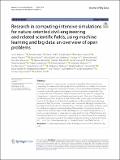Research in computing-intensive simulations for nature-oriented civil-engineering and related scientific fields, using machine learning and big data: an overview of open problems
Author(s)
Babović, Zoran; Bajat, Branislav; Đokić, Vladan; Đorđević, Filip; Drašković, Dražen; Filipović, Nenad; Furht, Borko; Gačić, Nikola; Ikodinović, Igor; Ilić, Marija; Irfanoglu, Ayhan; Jelenković, Branislav; Kartelj, Aleksandar; Klimeck, Gerhard; Korolija, Nenad; ... Show more Show less
Download40537_2023_Article_731.pdf (1.558Mb)
Publisher with Creative Commons License
Publisher with Creative Commons License
Creative Commons Attribution
Terms of use
Metadata
Show full item recordAbstract
Abstract
This article presents a taxonomy and represents a repository of open problems in computing for numerically and logically intensive problems in a number of disciplines that have to synergize for the best performance of simulation-based feasibility studies on nature-oriented engineering in general and civil engineering in particular. Topics include but are not limited to: Nature-based construction, genomics supporting nature-based construction, earthquake engineering, and other types of geophysical disaster prevention activities, as well as the studies of processes and materials of interest for the above. In all these fields, problems are discussed that generate huge amounts of Big Data and are characterized with mathematically highly complex Iterative Algorithms. In the domain of applications, it has been stressed that problems could be made less computationally demanding if the number of computing iterations is made smaller (with the help of Artificial Intelligence or Conditional Algorithms), or if each computing iteration is made shorter in time (with the help of Data Filtration and Data Quantization). In the domain of computing, it has been stressed that computing could be made more powerful if the implementation technology is changed (Si, GaAs, etc.…), or if the computing paradigm is changed (Control Flow, Data Flow, etc.…).
Date issued
2023-05-22Department
Massachusetts Institute of Technology. Institute for Data, Systems, and SocietyPublisher
Springer International Publishing
Citation
Journal of Big Data. 2023 May 22;10(1):73
Version: Final published version